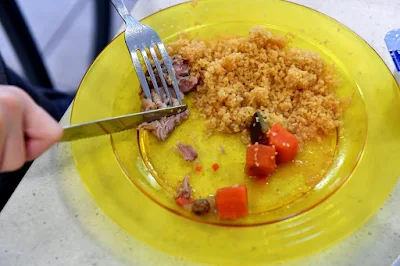Even if you feel lonely while trying to lose weight, you know in your gut you are never alone. And depending on what's in your gut, you may or may not have some help when you are dieting, according to a study just published in the International Journal of Obesity.
As you may know, your intestines are teeming with bacteria. They form these cities in your gut collectively called the microbiome. Now while these bacteria may not be helpful if you want someone to watch Netflix with you, Danish researchers found that the type of bacteria in your microbiome may affect how much weight you may lose from a particular diet.
Here's the poop on the study. Researchers from the University of Copenhagen, the Technical University of Denmark, the Steno Diabetes Center Copenhagen, and Gelesis Inc. measured and calculated the ratio of two bacteria, Prevotella and Bacteroides, in the poop from 62 people who were overweight. Then, the researchers randomly assigned the study participants to receive for 26 weeks either the ad libitum New Nordic Diet (NND), which high in fiber and wholegrains, or an Average Danish Diet (ADD).
The results? Among those with a high Prevotella to Bacteroides ratio, study participants on the high fiber (or NND) diet lost on average 3.15 kg (or 6.94 pounds) more body fat than those on the average Danish diet. By contrast, the two diets did not result in any significant difference among those with low Prevotella to Bacteroides ratios. In other words, different bacteria, different responses to the diet.
While this study doesn't necessarily prove that the bacteria in your intestines can help you predict how you will respond to a particular diet, it is further evidence that diet, metabolism, and weight loss form a much more complicated system than many previously realized. As I indicated previously for Forbes, the bacteria in your intestines can help you break down and absorb your food. One individual may try just as hard as (or harder than) others to lose weight and not get the same results. Although the bacterial content of the microbiome could be affected by something else that is affecting a person's ability to lose weight, increasingly it seems that your bacteria is playing a role in the processing of food in your body. So instead of blaming the individual, you may want to blame the bacteria (i.e., bacteria shaming) as well as other things in the person's life that could affect his or her weight (e.g., shaming bad social influences, broken food system, too much salt, sugar, and artificial ingredients in food, the chemicals in the environment, etc.)
A distinct possibility indeed, Dr. Linas. It could be that, in the future, poop tests (in the doctor's office or at home) will help guide diets and dieting. Diets and weight loss programs could become a lot more personalized and tailored to the individual. More research is needed to see how exactly this may unfurl.
Oh, poo, you may say, what if you are stuck with a "bad" microbiome? Well, evidence suggests that different things that you put in your mouth can affect your microbiome such as medications (especially antibiotics) and the food that you eat. Your surroundings such as pollution may also influence your microbiome composition. Although more research is needed to determine how exactly your diet and other factors may affect the bacteria in your intestines and how interventions such as probiotics may help, minimizing antibiotic use is one thing you may want to do immediately.
Taking more antibiotics than needed already clearly can lead to negative consequences such as antibiotic-resistant bacteria. Also, a study published in the International Journal of Obesity and led by Brian Schwartz, MD, Professor of Environmental Health Sciences and a member of our Global Obesity Prevention Center (GOPC) at Johns Hopkins University found an association between antibiotic use and subsequent development of obesity among children.
Other possibilities may be on their way. My earlier piece for Forbes described how researchers have been experimenting with fecal transplants (giving people poop from normal weight individuals) to help people lose weight.
The microbiome and poop are likely to play a bigger role in weight management in the future. Again obesity is not simple but is the result of complex systems. Addressing obesity requires addressing these complex systems. You know the two sayings, "pay attention to your friends" and "take care of your friends and they will take care of you"? The same may apply to your friends in your gut.
Follow me on Twitter @bruce_y_lee and visit our Global Obesity Prevention Center (GOPC) at the Johns Hopkins Bloomberg School of Public Health.
